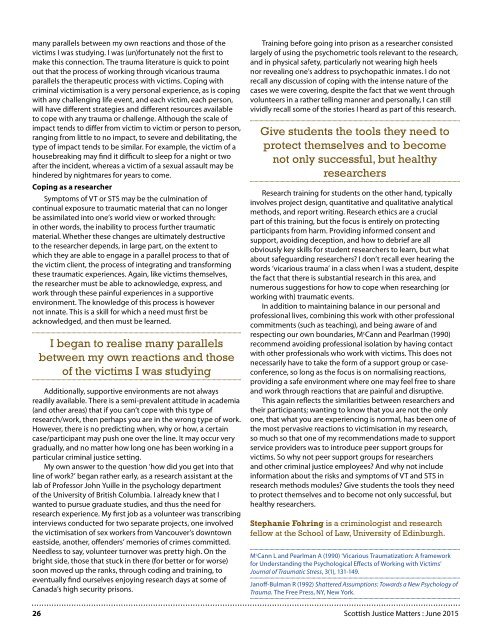Iy9yJ5
Iy9yJ5
Iy9yJ5
You also want an ePaper? Increase the reach of your titles
YUMPU automatically turns print PDFs into web optimized ePapers that Google loves.
many parallels between my own reactions and those of thevictims I was studying. I was (un)fortunately not the first tomake this connection. The trauma literature is quick to pointout that the process of working through vicarious traumaparallels the therapeutic process with victims. Coping withcriminal victimisation is a very personal experience, as is copingwith any challenging life event, and each victim, each person,will have different strategies and different resources availableto cope with any trauma or challenge. Although the scale ofimpact tends to differ from victim to victim or person to person,ranging from little to no impact, to severe and debilitating, thetype of impact tends to be similar. For example, the victim of ahousebreaking may find it difficult to sleep for a night or twoafter the incident, whereas a victim of a sexual assault may behindered by nightmares for years to come.Coping as a researcherSymptoms of VT or STS may be the culmination ofcontinual exposure to traumatic material that can no longerbe assimilated into one’s world view or worked through:in other words, the inability to process further traumaticmaterial. Whether these changes are ultimately destructiveto the researcher depends, in large part, on the extent towhich they are able to engage in a parallel process to that ofthe victim client, the process of integrating and transformingthese traumatic experiences. Again, like victims themselves,the researcher must be able to acknowledge, express, andwork through these painful experiences in a supportiveenvironment. The knowledge of this process is howevernot innate. This is a skill for which a need must first beacknowledged, and then must be learned.I began to realise many parallelsbetween my own reactions and thoseof the victims I was studyingAdditionally, supportive environments are not alwaysreadily available. There is a semi-prevalent attitude in academia(and other areas) that if you can’t cope with this type ofresearch/work, then perhaps you are in the wrong type of work.However, there is no predicting when, why or how, a certaincase/participant may push one over the line. It may occur verygradually, and no matter how long one has been working in aparticular criminal justice setting.My own answer to the question ‘how did you get into thatline of work?’ began rather early, as a research assistant at thelab of Professor John Yuille in the psychology departmentof the University of British Columbia. I already knew that Iwanted to pursue graduate studies, and thus the need forresearch experience. My first job as a volunteer was transcribinginterviews conducted for two separate projects, one involvedthe victimisation of sex workers from Vancouver’s downtowneastside, another, offenders’ memories of crimes committed.Needless to say, volunteer turnover was pretty high. On thebright side, those that stuck in there (for better or for worse)soon moved up the ranks, through coding and training, toeventually find ourselves enjoying research days at some ofCanada’s high security prisons.Training before going into prison as a researcher consistedlargely of using the psychometric tools relevant to the research,and in physical safety, particularly not wearing high heelsnor revealing one’s address to psychopathic inmates. I do notrecall any discussion of coping with the intense nature of thecases we were covering, despite the fact that we went throughvolunteers in a rather telling manner and personally, I can stillvividly recall some of the stories I heard as part of this research.Give students the tools they need toprotect themselves and to becomenot only successful, but healthyresearchersResearch training for students on the other hand, typicallyinvolves project design, quantitative and qualitative analyticalmethods, and report writing. Research ethics are a crucialpart of this training, but the focus is entirely on protectingparticipants from harm. Providing informed consent andsupport, avoiding deception, and how to debrief are allobviously key skills for student researchers to learn, but whatabout safeguarding researchers? I don’t recall ever hearing thewords ‘vicarious trauma’ in a class when I was a student, despitethe fact that there is substantial research in this area, andnumerous suggestions for how to cope when researching (orworking with) traumatic events.In addition to maintaining balance in our personal andprofessional lives, combining this work with other professionalcommitments (such as teaching), and being aware of andrespecting our own boundaries, M c Cann and Pearlman (1990)recommend avoiding professional isolation by having contactwith other professionals who work with victims. This does notnecessarily have to take the form of a support group or caseconference,so long as the focus is on normalising reactions,providing a safe environment where one may feel free to shareand work through reactions that are painful and disruptive.This again reflects the similarities between researchers andtheir participants; wanting to know that you are not the onlyone, that what you are experiencing is normal, has been one ofthe most pervasive reactions to victimisation in my research,so much so that one of my recommendations made to supportservice providers was to introduce peer support groups forvictims. So why not peer support groups for researchersand other criminal justice employees? And why not includeinformation about the risks and symptoms of VT and STS inresearch methods modules? Give students the tools they needto protect themselves and to become not only successful, buthealthy researchers.Stephanie Fohring is a criminologist and researchfellow at the School of Law, University of Edinburgh.M c Cann L and Pearlman A (1990) ‘Vicarious Traumatization: A frameworkfor Understanding the Psychological Effects of Working with Victims’Journal of Traumatic Stress, 3(1), 131-149.Janoff-Bulman R (1992) Shattered Assumptions: Towards a New Psychology ofTrauma. The Free Press, NY, New York.26 Scottish Justice Matters : June 2015


